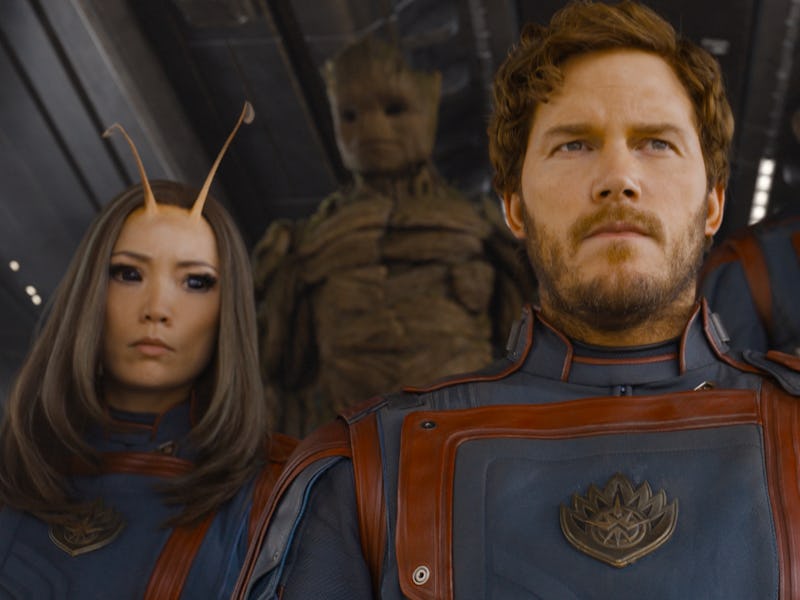Guardians 3 Can't Fix Marvel's Biggest Phase 5 Problem
Who does the MCU revolve around now?

The Marvel Cinematic Universe has been slowly but surely expanding ever since it launched in 2008. No matter how many new characters or franchises were introduced, though, the first three phases of the MCU revolved largely around three central heroes: Captain America (Chris Evans), Iron Man (Robert Downey Jr.), and Thor (Chris Hemsworth). When Steve Rogers and Tony Stark then stepped out of the spotlight in Avengers: Endgame, the MCU lost not only two of its original heroes but also the characters who could be relied on to lead the rest of the franchise’s Avengers.
In the years since Endgame, Marvel has failed to adequately compensate for the losses it suffered in that film. Indeed, while the studio has introduced plenty of new and memorable heroes over the course of the past four years, none of them have been set up to actually lead the MCU moving forward. In case that wasn’t bad enough, this year’s Guardians of the Galaxy Vol. 3 has just taken away even more of its original heroes.
Guardians of the Galaxy Vol. 3 permanently(?) retires some of the MCU’s most beloved heroes.
At the end of Guardians of the Galaxy Vol. 3, Rocket Raccoon (Bradley Cooper) assumes his position as the new leader of the film’s eponymous team, which now counts Adam Warlock (Will Poulter), Kraglin (Sean Gunn), Cosmo (Maria Bakalova), and Groot (Vin Diesel) among its members. Many of the film’s other heroes — namely, Mantis (Pom Klementieff), Drax (Dave Bautista), Nebula (Karen Gillan), and Gamora (Zoe Saldaña) — receive send-offs that fans have been led to believe will be permanent.
The film’s end credits tag notably promises that Star-Lord (Chris Pratt) will return at some point in the future, but it’s hard to envision right now what the character’s screen future could actually be. Pratt is, of course, one of the few legitimate, established movie stars that the MCU still has in its roster, but it seems unlikely that Marvel will try and insert him into the kind of Avengers-style leadership position that used to be filled by the likes of Chris Evans and Robert Downey Jr.
So where does that leave the MCU? Thor: Love and Thunder left its titular Norse god, the only remaining member of the MCU’s core three, in an odd, disconnected place from the rest of the franchise’s heroes. While it seemed, for a moment, like Benedict Cumberbatch’s Doctor Strange was going to become the new de facto leader of the MCU, last year’s Doctor Strange in the Multiverse of Madness also ended in a way that seemed to set him up for another solo adventure. The futures of other heroes, like Captain Marvel, Sam Wilson, Bruce Banner, and even Spider-Man, appear similarly unclear right now.
For the past few years, it’s seemed like Marvel has been preparing to center the MCU entirely around Jonathan Majors’ Kang the Conqueror. Recent headlines have thrown Majors’ future in the MCU into uncertain territory, though. As interesting as it might be for Marvel to make this era of the MCU so villain-centric, too, the franchise still needs a hero or two who can serve as legitimate counters to Kang if it wants to remain dramatically compelling moving forward.
Who among the MCU’s current heroes will be chosen to “assemble” Earth’s Mightiest Heroes in 2025’s Avengers: The Kang Dynasty?
The Inverse Analysis — To be fair to Marvel, the studio had a perfect successor to Iron Man and Captain America in Chadwick Boseman, but the late actor’s tragic death obviously erased the possibility of his T’Challa becoming the new king of the MCU. As unfortunate as that is, though, it doesn’t take away from the fact that Marvel still needs to find a way to fill the spaces left by Captain America and Iron Man’s exits.
The studio has introduced more heroes in the past four years than it, frankly, knows what to do with, but if it wants to save its marquee franchise, it has to find a way to elevate at least one of them to leadership status. It needs to do so soon, too. Otherwise, titles like Guardians of the Galaxy Vol. 3 and this summer’s Secret Invasion, which has been billed as Samuel L. Jackson’s last lead outing as Nick Fury, will just continue to take more potential candidates away from the MCU.